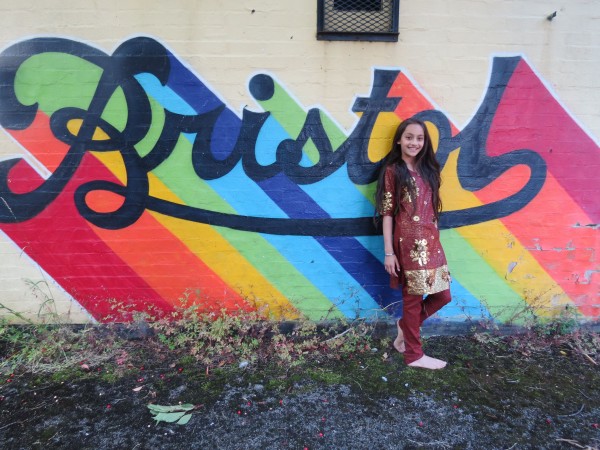
In November, Bristol’s M Shed will be showcasing Asian Arts Agency’s Desh Project, launching on 1 November with a day of free talks, artists’ performances and family-friendly activities, and with the digital exhibition running until 22 November.
Desh, meaning ‘Homeland/Motherland’ in Hindi, Punjabi and Urdu, is an intergenerational creative heritage project exploring and celebrating South Asian culture in Bristol and beyond, funded by Heritage Lottery Fund and created and produced by Asian Arts Agency.
We asked Jaswinder, Director of Asian Arts Agency, to explain a bit more to us about the project.
Hi Jaswinder. First of all, what is the Desh Project all about?
Desh (‘Homeland/Motherland’ in Hindi, Punjabi and Urdu) is an intergenerational creative heritage project exploring and celebrating South Asian culture in Bristol and beyond.
Asian Arts Agency initiated the development of ‘DESH” project in 2012. The idea was to inspire young people from South Asian background to learn more about their culture and heritage. Since 2013, young British Asians from Bristol and the surrounding areas have been speaking with South Asian elders to collect their oral histories and develop skills in animation, music and filmmaking. Exploring the themes of homeland, family, and cultural heritage, participants have created digital stories that look at ideas of the British Asian experience from the point of view of different generations.
Through workshops at The Station, The Bristol Asian Youth Club, M Shed, New College Swindon, Dhek Bhal and the Asian Day Centre, the Desh Project has worked with young people, adults, families and elders. Examining and interpreting South Asian visual arts, folk tales, religious ceremonies, food, music, and language, participants have interrogated concepts of tradition, migration and diaspora in the creation of their personal stories.
The result is a dynamic digital exhibition of traditional and contemporary interpretations of South Asian heritage, reflecting on the multi-faceted nature of British Asian identity and culture in the South West region today.
What is the inspiration behind the Project?
In 2007, to mark the 60th Anniversary of Independence of India, we worked with individuals from Sikh, Hindu and Muslim backgrounds settled in Bristol, who recalled their memories of the bloody partition of the Indian-subcontintent in 1947.
We created a high-quality and unique collection of Digital Stories that catalogued the varied and moving stories of South Asian Diasporas settled in our region. All participants were very keen to share these stories, but some individuals commented that they would like to also share their wider culture, and not just the stories associated with their migration. “Our identity is more than our story of migration” was a theme that emerged from this project. This has informed our thinking for the development of “Desh”.
How important do you think Asian communities have been with regards to Bristol culture and society?
I always believe every community in any city contributes to their society and culture. In fact this makes cities stronger. Similarly Asian communities have offered a lot to Bristol, whether it’s through sharing cultural values through food, music, cultural festivals, infrastructure and support services. As an arts agency we have delivered numerous participation and artistic projects in Bristol that have been attended by the wider communities in the city.
Is there an issue around access to art and culture for ethnic minority groups in Bristol and more generally?
There are issues around equality and access for Asian and ethnic minority groups in Bristol. The mainstream and major cultural institutions in Bristol offer opportunities but this could be improved and increased further to have a stronger sense of engagement with wider communities. Sometimes it’s not about always expecting the ethnic communities to participate in their existing program offer, but creating cultural and artistic projects that can appeal to these community groups. We need to enable a wider dialogue among communities so we can make our city a better place for all communities.
The project seems to be about exploring intergenerational communication as much as anything else – why is this particularly interesting?
The project is all about young people exploring their culture and heritage through the stories, memories, songs, folk tales, lifestyle etc. Therefore it was essential for them to work with adults and elders to listen to their stories, memories and reinterpret the collections from their point of view. The intergenerational aspect also enabled better communication among different generations, I mean for young people to learn and hear about the challenges and struggle faced by their elders when they migrated to the UK. Their sacrifices to ensure the next generations (i.e. current young people) have better opportunities, education and lifestyle. This enabled more respect for all generations.
What do you think makes Bristol such a thriving cultural hub?
Bristol has an excellent infrastructure in creative industries. There are so many creative people, arts institutions, artists and agencies based in Bristol who are constantly delivering groundbreaking cultural and creative projects. This allows new and emerging talent to not only come through but to contribute to innovation and new ideas.
What is it like working with M Shed?
M Shed were the ideal partner for this project and we’re very pleased to be showing the work in the museum of Bristol.
Young people taking part in the Workshops at M Shed were able to explore the M Shed storerooms not open to the general public and get a sense of the role of the museum in preserving the ongoing culture and history of Bristol.
Being able to integrate the stories of Asian communities into the permanent exhibition and archive will prolong the legacy of the project and become part of the history of Bristol’s Asian communities for generations to come.
Find out more about Desh Project
Conal Dougan